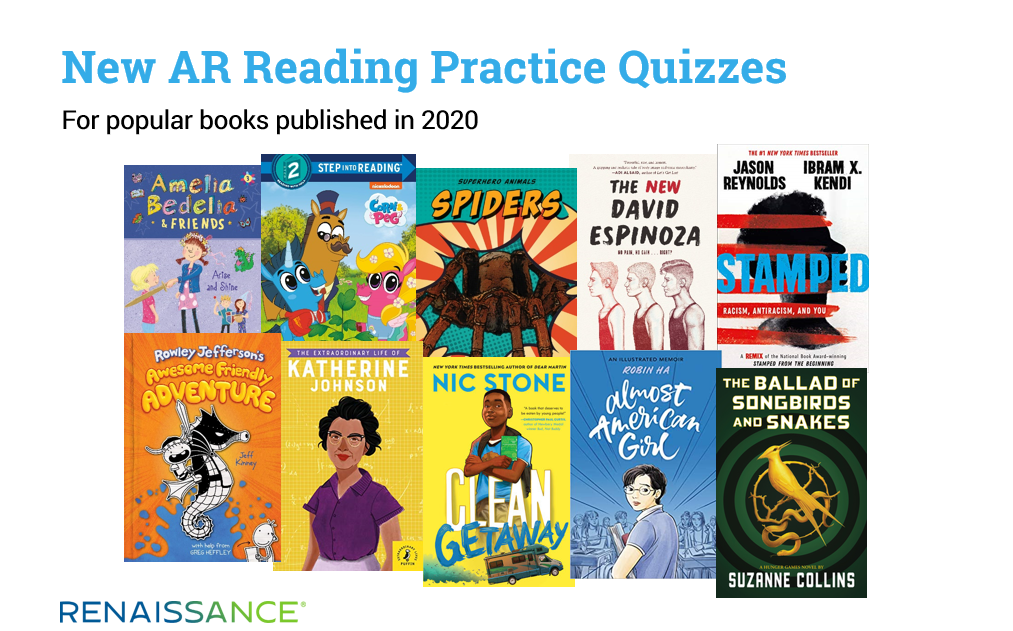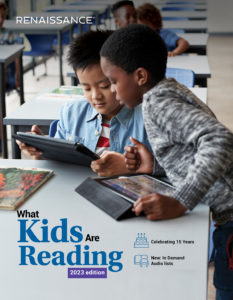September 3, 2020
Every school day, hundreds of thousands of students assess their reading comprehension by taking a Reading Practice Quiz in Accelerated Reader. More than 210,000 AR quizzes are available on a wide range of books, and districts can allow students to take AR quizzes from home. Reading Practice Quizzes span Kindergarten to grade 12. They also span decades of history, from classics such as The Secret Garden or Narrative of the Life of Frederick Douglass to titles published this year, including the latest book in the Amelia Bedelia series and The Ballad of Songbirds and Snakes.
Have you ever wondered how we choose the books that receive Reading Practice Quizzes in AR—and what the quiz-writing process involves? In this blog, we’ll give you an insider’s view of the making of a Reading Practice Quiz. Along the way, we’ll also answer some of the most common questions we receive about AR quizzes from teachers and librarians.
Selecting titles for Reading Practice Quizzes
Each year, we develop more than 6,000 new Reading Practice Quizzes to assess students’ comprehension of the books they’ve read. Our selections include both fiction and nonfiction titles, and we work hard to include books on a variety of topics and at a range of reading levels, along with the newest, most popular titles.
Not surprisingly, our biggest selection tool is the voice of teachers, librarians, parents, and the students themselves. We monitor requests made at AR Bookfinder, which allows us to hear directly from our customers. If you’re not familiar with AR Bookfinder, this is a great tool for finding books that have AR quizzes available. Users can quickly search by title or author, or they can use the “Advanced Search” option to explore various topics and subtopics, or to limit their results to either fiction or nonfiction, or to either English or Spanish.
You’ll see a “Suggest Quizzes” link in the upper right of every page of AR Bookfinder, which makes it easy to tell us about a book that would make a great addition to the collection. We receive hundreds of thousands of requests each year, mostly from librarians and teachers. So far this year, we’ve received more than 67,000 requests covering 29,623 unique titles. We’ve been able to fulfill 20,636 of those requests so far, with additional quizzes currently in development.
In addition to users’ suggestions, we use these resources to identify books for Reading Practice Quizzes:
- Titles from popular authors and series, such as Jeff Kinney, author of the Diary of a Wimpy Kid series, and Suzanne Collins, author of the Hunger Games series. As we know from the annual What Kids Are Reading report, these are two of the most popular series of the past decade.
- Magazines that review books for children and young people, including Publishers Weekly and School Library Journal.
- Many lists of award-winning titles, including lists of awards given by the American Library Association.
- Catalogs from publishers.
- Lists of upcoming titles from school library publishers, which produce book series that are primarily nonfiction.
About those popular book titles…
We know that students who are fans of certain authors or series are incredibly excited when a new book comes out—often counting the days until a title is released. And we want to do what we can to make the Reading Practice Quiz available soon after the book is available for purchase. We’ve been known to find creative ways to obtain titles as early as possible, including standing in line at midnight releases!
Our team has even written quizzes that have been available the day after the titles were released. For example, we know how much students love the Dog Man series. When Dog Man: Fetch-22 was released last December, we rallied our team together to have the book processed and the quiz written, edited, and released the following day. And we can tell that students are happy about this—the quiz has already been taken over 190,000 times!

Steps for creating a Reading Practice Quiz
Before a Reading Practice Quiz can be written, we have to complete the important first step of processing the book. There are multiple components to this, including:
- Verifying information. Our staff verify and enter book information in our Content Management System. This includes the book’s title, author, publisher, and year of publication—all of which are critical for helping students to quickly locate the quiz. We also add ISBN information for all binding types, from various publishers, and for all editions that will be supported by the quiz.
- Determining Interest Level. With the title in hand, and after viewing book reviews and recommendations from the publisher, we determine the book’s Accelerated Reader Interest Level. Four levels are used: lower grades (LG), middle grades (MG), middle grades plus (MG+), and upper grades (UG).
- Writing the summary. We write a brief summary of the book, which appears in AR Bookfinder and in Accelerated Reader. Later, during the quiz writing and editing stages, the summary is updated if necessary to note areas of potential concern to an educator or parent, such as profanity, violence, etc.
- Adding topics and subtopics. We add to the book record topics and subtopics, to enable users to search by various categories in AR Bookfinder, including:
- Series name
- Genre
- High interest/low level titles
- myON core collection titles
- Literacy Award winners, for awards such as the Newbery Medal
- Recommended reading lists, such as Notable Books for a Global Society
- Our What Kids Are Reading lists
- Assessing the readability level. We use our ATOS analyzer—a readability formula developed specifically for Renaissance—to determine the title’s readability level. Both AR and AR Bookfinder also display Lexile® levels. The combination of readability and interest level provides a powerful tool to determine if a book is an appropriate match for a student—neither too easy (causing boredom) nor too difficult (causing frustration).
Writing and editing the Reading Practice Quiz
Once processing is complete, one of our 20-plus content designers selects the book for quiz writing. Within about a week’s time—sooner if the book is popular and student demand is high—the writer will have read the book and written a “raw” quiz that is ready for a series of rigorous editing steps:
- Reviewing each quiz question against the book’s content. In this step, editors check that all the information in the questions and the correct responses is accurate when compared to the book. They also review the distractors (incorrect answers) for plausibility, making sure that the distractors are obviously wrong to students who have read and comprehended the text—but are plausible to a student who has not read the text. Editors also ensure the quiz is not too easy or too difficult, based on the ATOS book level of the text. In addition, they verify that quiz questions are dispersed evenly throughout the text to encourage students to read the entire book, not just the beginning or the end.
- Evaluating the quiz’s quality. A second editor then reviews the quiz, continuing to ask questions such as: “What might be confusing for a student?,” “What wording might be unclear?,” “Is the quiz free of bias?,” and “Does the vocabulary level and complexity of the questions and answers match that of the text?”
- Checking the quiz. One of the final quality-check steps occurs when an editor takes the quiz within Accelerated Reader, just as a student would. If the team feels good about the quiz at that point, it’s approved for release. If not, the team takes a step back and reworks some of the questions.
Once finalized, the quiz is released for Accelerated Reader, and students can begin taking the quiz.
Teamwork and taking pride
In the Content department at Renaissance, books and quizzes pass through many hands—from title selection to processing, writing, and editing. As a title is moving through this process, each member of our team is constantly thinking of the last person who will touch our product—namely, the student who will take the Reading Practice Quiz. We know that, with the guidance of an expert teacher, personalized practice through Accelerated Reader can help every student to discover a lifelong love of reading. That is why we take great care and pride in developing quizzes for our customers and their students, and why we are committed to our purpose of accelerating learning for all.
Of course, Accelerated Reader involves more than Reading Practice Quizzes. Students also have access to Vocabulary Practice Quizzes, Literacy Skills Quizzes, and more. We take a closer look at these quiz types, along with Spanish-language AR quizzes, in a second blog, which you can access here.
Learn more
Looking for diverse books to engage your students? Check out the latest edition of What Kids Are Reading, the world’s largest annual study of K–12 student reading habits. And to see everything that today’s Accelerated Reader has to offer, click the button below.

